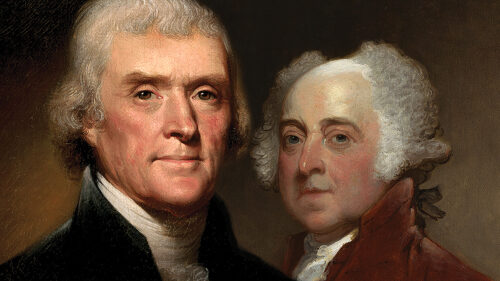
From Bullets to Ballots: The Election of 1800 - Glossary
Glossary
Anti-federalists
Opponents of the United States Constitution during the debate over its ratification (1787-1788).
Country ideology
Also called opposition ideology. Historians’ term for the attitudes, opinions and anxieties of certain eighteenth-century English political writers critical of the English political and financial establishment, convinced that executive (“court party”) patronage had damagingly corrupted the English Parliament.
Electoral college
The method of electing United States presidents, set out in Article II of the Constitution.
Federalists
Advocates and supporters of the United States Constitution during the debate over its ratification (1787-1788). In the 1790s, the party that supported the policies of the administrations of Presidents Washington and Adams.
Funding
Providing specific revenues to pay regular interest on a public debt.
Jacobin
During the French Revolution, a group advocating the pursuit of extreme egalitarianism, in the name of the people but by an unaccountable elite using terrorist methods.
Loyalists
British North American colonists who, during the American Revolution, opposed American independence and remained loyal to Britain.
Opposition ideology
See country ideology.
Parties of interest
Political science term for political parties that are animated mainly by the prospect of influencing public policy to protect or to promote particular economic interests.
Parties of principle
Political science term for political parties that are animated mainly by the prospect of influencing public policy to protect or to promote political principles, programs, or sets of policies.
Party government
The openly acknowledged and publicly respectable practice of parties organized to compete for office, with the right of such parties to influence or to control government policy.
Patriots
American advocates and supporters of the independence of the United States from Britain, before and during the American Revolution.
Republicans
Members and supporters of the political party organized by Thomas Jefferson and James Madison in the first American party system (1790s-1820s). Later also the name of the (new) party that brought Abraham Lincoln to the presidency in 1861. (When not capitalized, the word “republican” means advocating or having to do with republican government.)
Republic, republican government
A government in which all offices are directly or indirectly filled by elections by the people, rather than by inheritance. In other words, a representative democracy.
Second party system
The period of party competition in the United States from the 1830s to the 1850s, during which the major parties were Whigs and Democrats (replacing the Federalists and Republicans of the first party system).
Sedition
Actions or words inciting rebellion against a government.
Tory
Originally, English political groups who opposed the right of Parliament to exclude a Catholic as king (1681); later, the English party eventually called the Conservative party. In the United States, a loyalist during the American Revolution.
Whig
Originally referred to the political forces in England who opposed the succession of a Catholic to the English throne (1681), and who insisted on the rights of Parliament versus the monarch, especially in determining the country’s established religion. In the United States, “Whig” was the equivalent of “Patriot” during the American Revolution, and later the name of one of the two major parties during the second party system, indicating that party’s suspicion of executive (presidential) power.)
